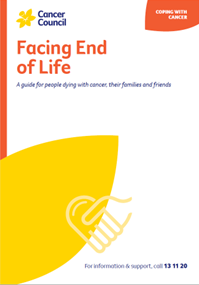- Home
- About Cancer
- Advanced cancer
- Facing end of life
- Choosing where to die
- In your own home
In your own home
If asked, many people say they want to die at home. This may be because they want to be around familiar surroundings and people.
Learn more about:
What kind of support is available?
While this option is not for everyone, if you do want to be at home, support is available. This may vary from a few hours a week to a few hours a day to 24-hour care (although 24-hour care is very expensive). Your GP, nurse, palliative care specialist or palliative care nurse practitioner can suggest services to manage symptoms such as pain or breathlessness. They can also teach carers how to assist with day-to-day activities such as bathing and eating. Even if you live alone, with planning, you can stay as long as possible in your own home.
Some carers may find having you nearby easier. It may mean that they don’t have to travel, or fit in with a hospital or palliative care routine. Caring for someone who is dying at home can be a meaningful experience, but it can also be challenging.
For more on this, see Caring for someone nearing the end of life.
Can you change your plan?
Sometimes people go into a palliative care unit or hospital to have symptoms managed or to give their carers a break (respite), and then return home. Or they may decide it’s not possible to stay at home, even with home help, and that they would be more comfortable in a palliative care unit or hospital.
You can decide at any stage to change your mind about staying at home and explore other options. If you are planning to stay at home until the end, talk to your GP or palliative care team about ways of dealing with unexpected medical events.
Key points about dying at home
- Being cared for in a familiar environment, surrounded by people you know, may help your emotional wellbeing.
- You can spend more time with family and friends, as there are no visiting hours.
- Depending on your situation and preferences, your family and friends can be at your side at all times.
- Being at home may offer more flexibility to maximise your quality of life.
- It may feel more natural and less clinical, while still giving you access to expert medical advice and symptom control.
- It allows you a sense of control over the last part of your life.
- Your family and friends may find comfort in providing most of your care.
- A range of services can give you and your carers help and support. Keep a list of phone numbers handy for when you need advice and support.
- After death, family and friends can grieve at their own pace and decide when to call the ambulance or funeral home.
→ READ MORE: In a palliative care unit
Podcast: End-of-Life Care at Home
Listen to more of our podcast for people affected by advanced cancer
More resources
Prof Jane Phillips, Head, School of Nursing and Professor, Centre for Healthcare Transformation, Queensland University of Technology and Emerita Professor Palliative Nursing, University of Technology Sydney, NSW; Prof Meera Agar, Palliative Care Physician, Professor of Palliative Medicine, University of Technology Sydney, IMPACCT, Sydney, NSW; Sandra Anderson, Consumer; A/Prof Megan Best, The University of Notre Dame Australia and The University of Sydney, NSW; Prof Lauren Breen, Psychologist and Discipline Lead, Psychology, Curtin University, WA; David Dawes, Manager, Spiritual Care Department, Peter MacCallum Cancer Centre, VIC; Rob Ferguson, Consumer; Gabrielle Gawne-Kelnar, Counsellor, Psychotherapist and Social Worker, One Life Counselling & Psychotherapy, NSW; Justine Hatton, Senior Social Worker, Southern Adelaide Palliative Services, Flinders Medical Centre, SA; Caitlin MacDonagh, Clinical Nurse Consultant, Palliative Care, Royal North Shore Hospital, Northern Sydney Local Health District, NSW; McCabe Centre for Law and Cancer; Palliative Care Australia; Belinda Reinhold, Acting Lead Palliative Care, Cancer Council QLD; Xanthe Sansome, National Program Director, Advance Care Planning Australia; Kirsty Trebilcock, 13 11 20 Consultant, Cancer Council SA.
View the Cancer Council NSW editorial policy.
View all publications or call 13 11 20 for free printed copies.
Need to talk?
Support services
Caring for someone with cancer
Speak to a health professional or to someone who has been there, or find a support group or forum
Cancer Council Online Community
A community forum – a safe place to share stories, get tips and connect with people who understand
Cancer information
Advanced cancer
Information for all stages of advanced cancer, from the initial diagnosis to palliative care and grief
Resource hub
Guides, fact sheets, videos, podcasts and more for people with cancer, their families and friends

